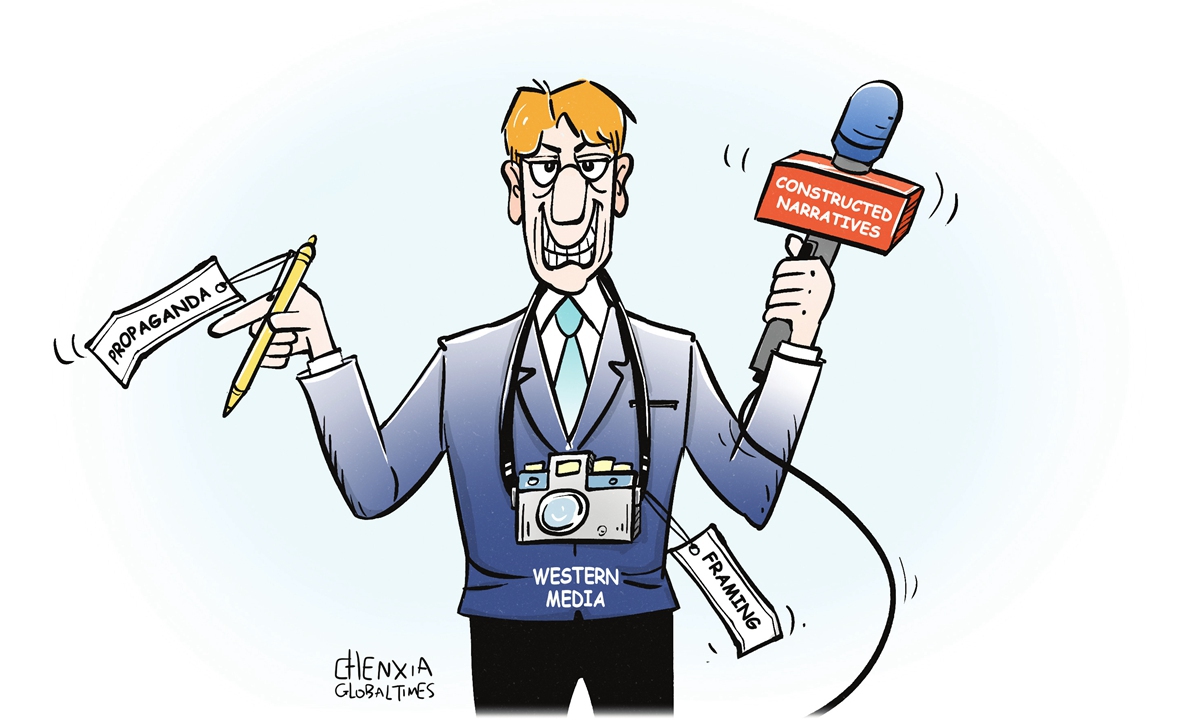
Illustration: Chen Xia/Global Times
A recent video interview published by the Financial Times (FT) caused a backlash online. In the video titled "Should the US ban Chinese drones?" the publication presented a "textbook" process of fabricating and spreading misinformation. One insider interviewed by FT confidently claimed that the group photo of DJI employees, in reality taken in front of the former site of the Huangpu Military Academy in a 4A-level scenic area in China, was "evidence" of "military training" to prove that "DJI has links with the Chinese military." As of November 27, the video remains on the FT website, with no corrections or apologies from FT.
From a professional perspective, verifying these basic facts is hardly difficult. It only requires basic knowledge and understanding of Chinese history. The former site of the Huangpu Military Academy is a well-known landmark in China and has always been open to the public in the form of a memorial. DJI's recent event was also not a secret; and the photo that FT used was just posted on the event organizer's official website. This shows some Western elites' biases against China have gotten worse. They see a photo and, like triggering an automated process, their pre-set arguments are inserted into the system, deliberately using fragments of information to prove, rather than test, their assumptions. This is also why so many netizens can immediately spot something that looks "fake" at the first glance, while editors and journalists from FT, with their Western higher education, fail to notice the issue.
Some Western countries have long engaged in systematically spreading rumors and defaming Chinese companies, including DJI. They search for "evidence" to support "charges," and when they can't find any, they simply fabricate it. This has formed an ecosystem.
In this "rumor factory" filled with false and misleading information, Washington is the mastermind, and some media outlets are the accomplices. From "threatening national security" and "stealing Americans' information" to "forced labor," they have attached every possible accusation to DJI, yet they still have not provided a single piece of concrete evidence. In October this year, DJI filed a lawsuit against the US Department of Defense, accusing the Pentagon of erroneously including the company on the "Chinese Military Companies" blacklist and of causing significant financial losses. There has been no formal response from the Pentagon until now. Perhaps it simply does not dare to face public confrontation.
Currently, Chinese companies face numerous obstacles in conducting normal business and investments in the US and some Western countries. How much of this stems from deliberate suppression by politicians and irresponsible, false sensationalized reporting by the media? Despite such unfavorable circumstances, China has maintained its position as the world's largest exporter of civilian drones for several consecutive years. In the US, approximately four out of every five agricultural drones are DJI models. DJI drones are also widely used by police officers, firefighters, and rescue workers across the country in various scenarios, receiving high praise for their performance. US lawmakers have repeatedly attempted but failed to pass bills for a total ban on DJI, and some industry professionals are even willing to purchase DJI drones out of their own pockets. These facts all highlight that DJI is safe and reliable.
Being trapped in their own "information cocoons" while accusing others of the same; accusing others of fabricating false information while actually being the source of it themselves - this is common among some Western media outlets. They harbor biases against a significant portion of things in the world and are only willing to see the fragments of information they want to see. They have at many times violated journalistic ethics and spread false information. However, rarely do they reflect on and correct their errors in line with the professionalism they often preach. This arrogance is both absurd and harmful. In this sense, the FT not only owes DJI a public apology but also needs to apologize to its Western audience.
Whether meticulously crafted or crudely fabricated, false information cannot alter this fundamental fact: China is the world's largest exporter of civilian drones and also the world's leading source of technology. The achievements of China's drone industry benefit the entire globe, offering advancements that are shared worldwide. With the rapid evolution of drone technology and the development of the low-altitude economy, rejecting China's contributions means embracing stagnation. Recently, Tesla CEO Elon Musk liked and reposted a video of a Chinese drone swarm performance on social media, marking the third time this year he has expressed admiration for Chinese drones. The benefits of fostering healthy competition are being increasingly recognized. It is time for some people to step out of their "information cocoons."



